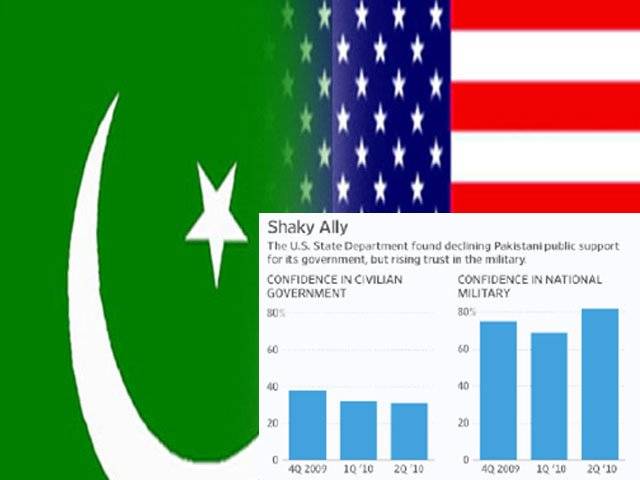The United states -- ignoring Pakistani military's sacrifices in combating extremists -- has harshly criticized its campaign in tribal areas, stating bluntly that Pakistan has been unwilling to aggressively pursue Al-Qaeda and Afghan Taliban militants. Pakistan's government and military's criticism is contained in a new White House assessment, which also criticizes the leadership of President Asif Ali Zardari, The Wall Street Journal said in a dispatch from Washington on Wednesday. The strongly-worded assessment, according to the newspaper, could further strain difficult relations with a key ally -- already exacerbated by NATO' cross-border attack, undercut support in Congress for providing billions of dollars in aid to Pakistan, the newspaper said. Pakistan blocked a vital supply route for US-led NATO forces fighting in Afghanistan after the strike, citing security reasons. The White House report also raises questions about the U.S.-led coalition's progress battling the Taliban and improving governance in Afghanistan two months before the White House will review its war strategy, it said. The Pakistan military continued to avoid military engagements that would put it in direct conflict with Afghan Taliban or Al-Qaeda forces in North Waziristan, the assessment said. This is as much a political choice as it is a reflection of an under-resourced military prioritizing its targets, the report said. The White House assessment of Pakistan was included with a letter US President Barack Obama sent congressional leaders last week saying he had no plans for any major changes in his Afghanistan war strategy. But the United States, in recent weeks, stepped up drone aircraft attacks against militants in Pakistan, most of them taking place in North Waziristan. The Wall Street Journal cited Pakistani officials as saying that they don't lack the will and that they have generally stepped up their efforts in response to U.S. requests, getting too little credit for it. But they say their army is already stretched thin a problem exacerbated when soldiers were diverted to respond this summer to the worst flooding in the country's history. U.S. officials, according to the Journal, say they are increasingly frustrated by Pakistan's decision not to send large numbers of ground forces into North Waziristan. In the neighboring tribal region of South Waziristan, "Pakistani military operations advanced slowly" because they haven't been able to stabilize areas after they clear them of militants, the White House found. There, "the military largely stayed close to the roads and did not engage against those [Pakistani Taliban] militants who returned after fleeing into North Waziristan." While the Pakistani military has dedicated 140,000 forces to the tribal areas, "the Pakistan military was nonetheless constrained to disrupting and displacing extremists groups without making lasting gains against the insurgency." The report, issued by the National Security Council in response to a congressional requirement for regular progress updates, reflects the input of numerous agencies, including the State Department, Pentagon and intelligence agencies. Questions about aid to Pakistan have been growing in Congress in recent months, and congressional aides said the downbeat assessment could fuel lawmakers' qualms and calls for putting more conditions on U.S. funding, the newspaper said. The report also says Pakistan's civilian leadership faces "broad-based" challenges that "have the potential to impact the stability of the government." Massive floods and tensions between political parties have compounded problems facing President Zardari, it says. The government's clumsy response to the flooding has greatly undermined the already shaky public support for Mr. Zardari, the report says. "President Zardari's decision to travel to Europe despite the floods exacerbated inter-party tensions, civil-military relations, and damaged his image in the domestic and international media," the report says, noting that local polls shows that the public considers the civilian government's response to be slow and inadequate. Even before the flooding, Mr. Zardari faced "broad lack of political support," the White House says, in addition to a fragile economy and difficult relations with the military. The report notes the wide gap in public esteem for civilian and military institutions. Confidence in the civilian government has fallen from 38% at the end of 2009 to 31% in mid-2010, while confidence in the military has grown from 75% to 82% during the same time period. Lack of will has also hampered Pakistan's budget management, the report concludes. While the Pakistani government has worked closely with the U.S. Embassy to improve the use of U.S. aid, "a lack of political will on budget implementation and overall donor assistance continues to be a major challenge."
Thursday, April 18, 2024
US report slams Pakistani drive against militants, takes Zardari in its sweep

Stefanos Tsitsipas advances in Barcelona
4:19 PM | April 18, 2024
Met Office predicts more rains across country till April 29
2:51 PM | April 18, 2024
Punjab changes school timings for summer season
1:55 PM | April 18, 2024
Enemies of Pakistan are unable to digest investment in the country: Ataullah Tarar
1:29 PM | April 18, 2024
IHC restores Bushra Bibi's appeal for shifting to Adiala Jail from Bani Gala
1:24 PM | April 18, 2024
Hepatitis Challenge
April 18, 2024
IMF Predictions
April 18, 2024
Wheat War
April 18, 2024
Rail Revival
April 17, 2024
Addressing Climate Change
April 17, 2024
Justice denied
April 18, 2024
AI dilemmas unveiled
April 18, 2024
Tax tangle
April 18, 2024
Workforce inequality
April 17, 2024
New partnerships
April 17, 2024
ePaper - Nawaiwaqt
Advertisement
Nawaiwaqt Group | Copyright © 2024





